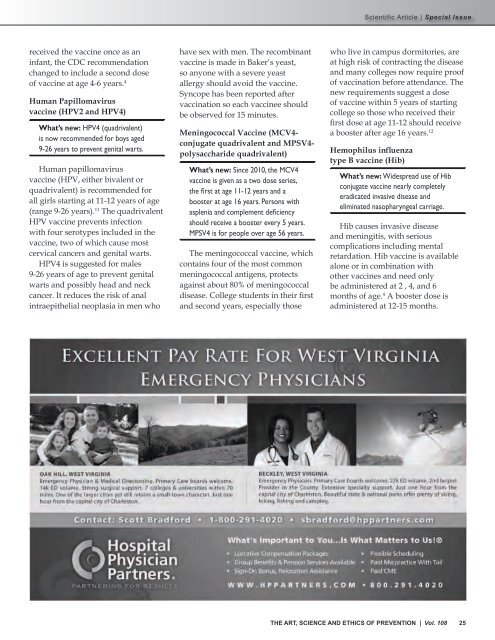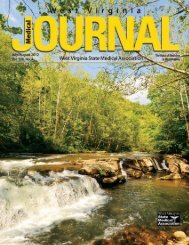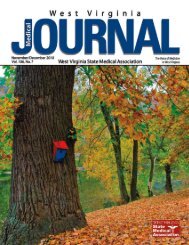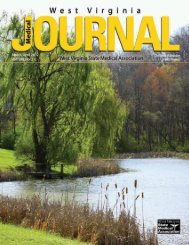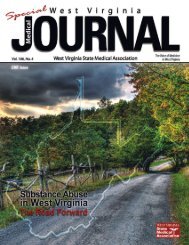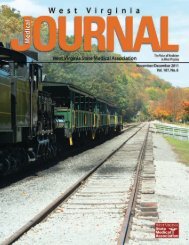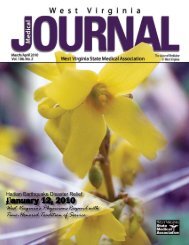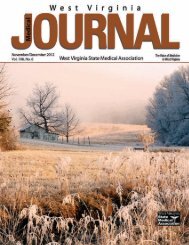Special CME Issue - West Virginia State Medical Association
Special CME Issue - West Virginia State Medical Association
Special CME Issue - West Virginia State Medical Association
Create successful ePaper yourself
Turn your PDF publications into a flip-book with our unique Google optimized e-Paper software.
eceived the vaccine once as an<br />
infant, the CDC recommendation<br />
changed to include a second dose<br />
of vaccine at age 4-6 years. 4<br />
Human Papillomavirus<br />
vaccine (HPV2 and HPV4)<br />
What’s new: HPV4 (quadrivalent)<br />
is now recommended for boys aged<br />
9-26 years to prevent genital warts.<br />
Human papillomavirus<br />
vaccine (HPV, either bivalent or<br />
quadrivalent) is recommended for<br />
all girls starting at 11-12 years of age<br />
(range 9-26 years). 11 The quadrivalent<br />
HPV vaccine prevents infection<br />
with four serotypes included in the<br />
vaccine, two of which cause most<br />
cervical cancers and genital warts.<br />
HPV4 is suggested for males<br />
9-26 years of age to prevent genital<br />
warts and possibly head and neck<br />
cancer. It reduces the risk of anal<br />
intraepithelial neoplasia in men who<br />
have sex with men. The recombinant<br />
vaccine is made in Baker’s yeast,<br />
so anyone with a severe yeast<br />
allergy should avoid the vaccine.<br />
Syncope has been reported after<br />
vaccination so each vaccinee should<br />
be observed for 15 minutes.<br />
Meningococcal Vaccine (MCV4-<br />
conjugate quadrivalent and MPSV4-<br />
polysaccharide quadrivalent)<br />
What’s new: Since 2010, the MCV4<br />
vaccine is given as a two dose series,<br />
the first at age 11-12 years and a<br />
booster at age 16 years. Persons with<br />
asplenia and complement deficiency<br />
should receive a booster every 5 years.<br />
MPSV4 is for people over age 56 years.<br />
The meningococcal vaccine, which<br />
contains four of the most common<br />
meningococcal antigens, protects<br />
against about 80% of meningococcal<br />
disease. College students in their first<br />
and second years, especially those<br />
who live in campus dormitories, are<br />
at high risk of contracting the disease<br />
and many colleges now require proof<br />
of vaccination before attendance. The<br />
new requirements suggest a dose<br />
of vaccine within 5 years of starting<br />
college so those who received their<br />
first dose at age 11-12 should receive<br />
a booster after age 16 years. 12<br />
Hemophilus influenza<br />
type B vaccine (Hib)<br />
What’s new: Widespread use of Hib<br />
conjugate vaccine nearly completely<br />
eradicated invasive disease and<br />
eliminated nasopharyngeal carriage.<br />
Hib causes invasive disease<br />
and meningitis, with serious<br />
complications including mental<br />
retardation. Hib vaccine is available<br />
alone or in combination with<br />
other vaccines and need only<br />
be administered at 2 , 4, and 6<br />
months of age. 4 A booster dose is<br />
administered at 12-15 months.<br />
THE ART, SCIENCE AND ETHICS OF PREVENTION | Vol. 108 25


